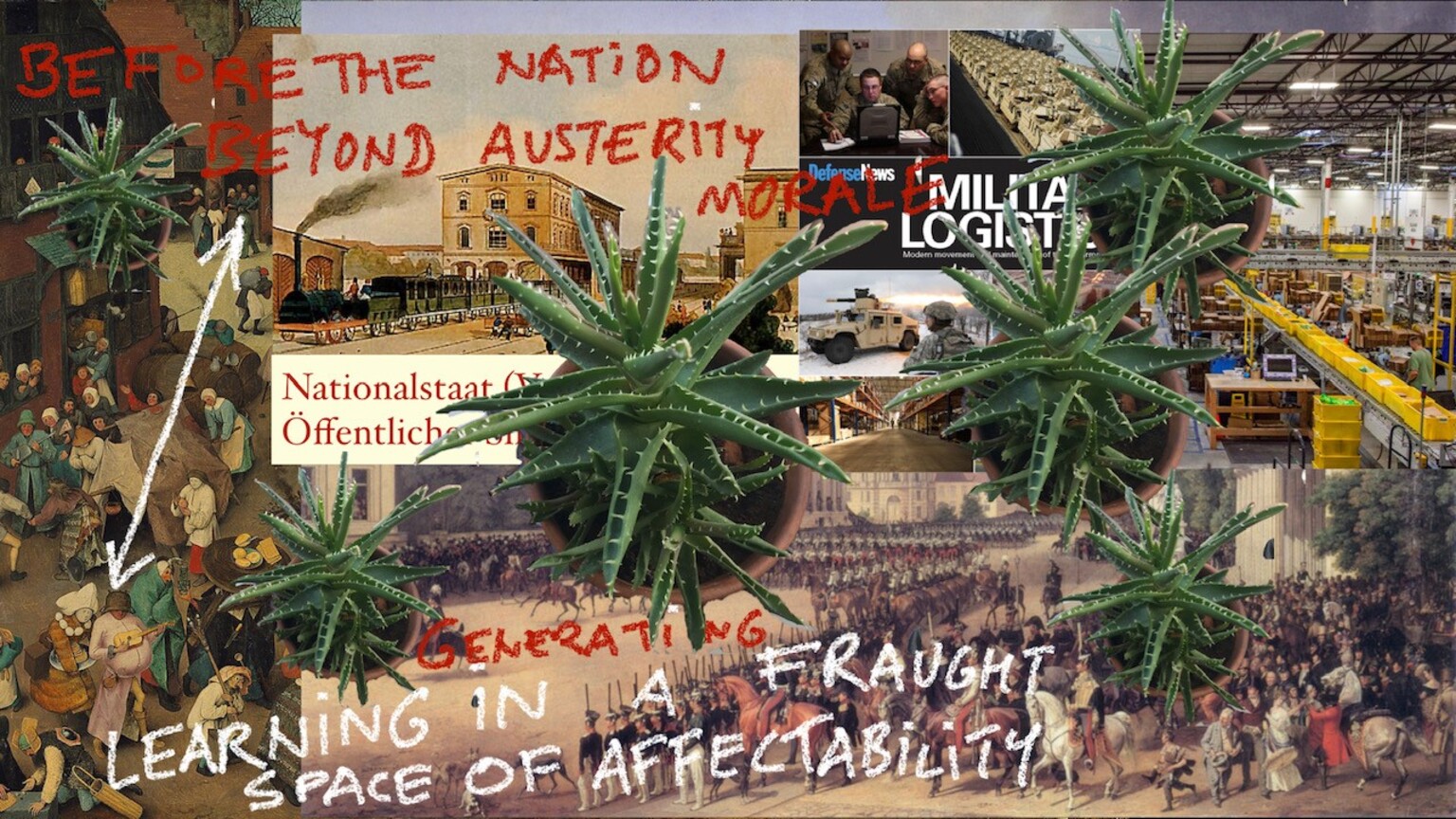Talk

Open Lecture: Jan Verwoert / Open rehearsals in unlearning Proprietary methods of "(Kn)ow(n)ing thyself" part II
Before the nation, beyond austerity morale. Generating learning in a fraught space of affectability.
Register in advance for this webinar:
Zoom/webinar/register
A series of 3 monthly talks
The arts inherit an idea of authorship based on conscious ownership: "I had the idea, I knew exactly what to do, I did it, so the work is mine, and I know what it means." My intention, my method, my meaning, my project = my property. In the arts, struggle over gaining recognition is existential. Privilege rears its ugly head when those on top of hierarchies take credit for contributions made by others — whose work is thereby rendered invisible. The fight against exclusion is on, and authorised visibility [visible authorship] is at stake. Yet what if it's not only people but very much also concepts that govern the rites of recognition? If so, the challenge lies in taking on the whole machinery of definitions that decide what legitimately counts as art [authorship], on what terms the legitimation is given, who gets to be the judge, who can claim the right [authority] of being considered an artist [author], and what it means to win that claim.
This series of talks will begin by taking a closer look at how the scientific protocol for the personal ownership of knowledge was formalised in René Descartes 1637 "Discourse de la méthode". The rites of authorising knowledge as 'proper' knowledge are still governed by his formula for proprietary consciousness [my method, my project, my property].
Yet from the start a problem presents itself: how do you know how to apply method? What method can teach you the method to tell when to use which method, and how? As method chases its own tail, Descartes gets shaky. His shakes disturb applied practices [practices of application] to this day: art and teaching live in the space of application that baffles the proprietary method because here truth may transpire between people in many a mode, manner, fashion, process and key.
Historically, the gap between modern method and the material world has been closed by violence. Its tool is ap-propri-ation, an instrument wielded, with executive privilege, by scientific man. The arts as well as many applied modes of being, knowing and acting in relation to, and concert with [materials, souls and surroundings] find themselves overruled.
Along this axes of violence, epistemic struggles intersect with fights for planetary justice. As Denise Ferreira da Silva makes clear in her 2007 book "Toward a global idea of race" the protocol drafted by Descartes and refined by subsequent thinkers like Hegel [for an isolated consciousness, people or nation to authorise its claim to the possession of proper knowledge and power over the world] represented the world in such a way that it would appear ready for the taking: The calculus establishing the authority of the proprietary mind [meant to know and own the world] also designates everything and everyone else out there as the legitimate object of knowledge, property and possession for this all-owning-knowing mind. The drive toward racialisation, objectification and enslavement is built into the protocol for world-owning-knowing. The subject of proper knowledge assumes its place of authority by subjecting others to its rule. As Ferreira da Silva shows: the triumph of becoming untouchable inside the bastions of white thought means for everyone and everything else to be exposed to power without protection, and caught in a state of full affectability.
The series of talks will hence seek to pursue and interweave three different lines of thought: >How do artistic struggles over the terms for authorising authorship [as the rightful visible ownership of one's own proper acts and ideas] intersect with a political fight over the social protocols for claiming authority [over one's own consciousness, as well as the power to possess and act upon things in the world]? >If the dominant cult of methodology should be a white power technology for making oneself untouchable, what does it mean to grasp and refuse its protocols? >How to voice emergent truths from within the horizon of affectability and application?
Jan Verwoert is a critic and writer on contemporary art and cultural theory, based in Berlin. His writing has appeared in different journals, anthologies and monographs. He teaches at the Piet Zwart Institute Rotterdam. He is a professor for theory at the Oslo National Academy of the Arts. He is the author of Bas Jan Ader: In Search of the Miraculous, MIT Press/Afterall Books 2006, the essay collection Tell Me What You Want What You Really Really Want, Sternberg Press, Berlin/Piet Zwart Institute, Rotterdam 2010, together with Michael Stevenson, Animal Spirits — Fables in the Parlance of Our Time, Christoph Keller Editions, JRP, Zurich 2013, a second collection of his essays Cookie! published by Sternberg Press, Berlin/Piet Zwart Institute, Rotterdam 2014. Verwoert is the editor of the anthology on artistic knowledge No New Kind of Duck — Would I Know how to Say what I Do?, Diaphanes & UdK Graduate School, Zurich-Berlin 2016, together with Daniel Pies: What if It Won’t Stop Here?, Archive Books & UdK Graduate School, Berlin 2018, and, with Polys Peslikas: Umm Kulthum Faints on Stage, Sternberg Press, Berlin and Cyprus Ministry of Education and Culture 2020.